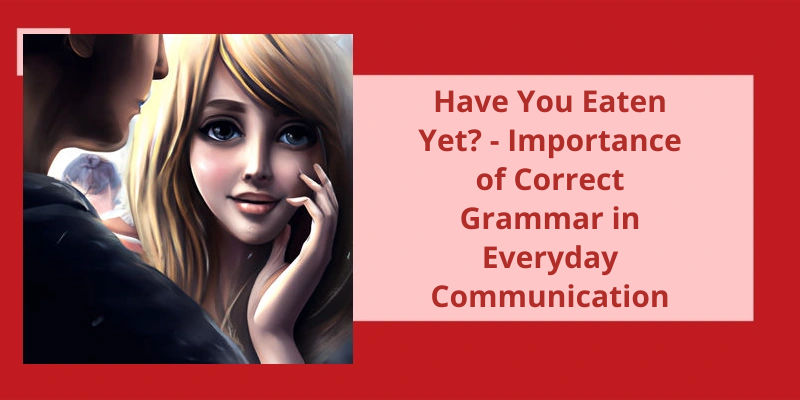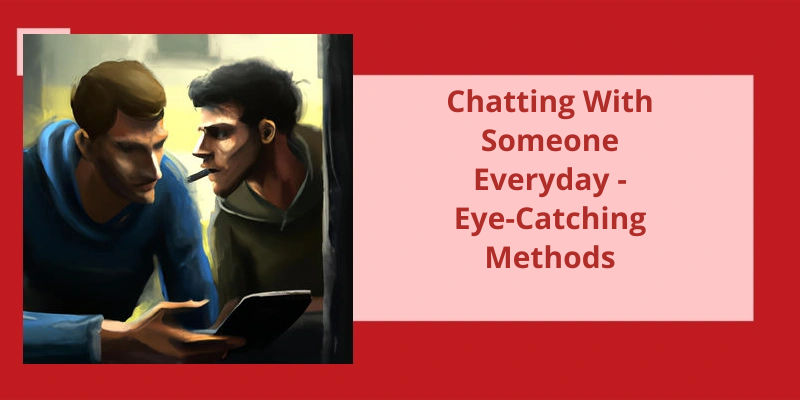As a frequent phrase in casual conversation, "have you eaten yet?" can serve as a simple greeting or a genuine inquiry about a person's hunger levels. In the United States, this question and it’s counterpart "have you’d anything to eat?" are both commonly used and accepted as grammatically correct. While it may seem like a mundane question, asking someone if they've eaten yet can sometimes lead to unexpected conversations and connections, making it a small but significant part of everyday social interaction.
Is Have You Eaten a Correct Sentence?
One of the fundamental aspects of the English language is it’s grammar. Grammar plays a critical role in the way we communicate and express ourselves. It’s important to be familiar with basic grammar rules, such as sentence structure and verb tense, to effectively convey our thoughts and ideas.
A common question that often arises when it comes to the English language is whether a particular sentence is grammatically correct. One such example is the sentence, “Have you eaten?”. This sentence is a perfect example of the present perfect tense, which is used to describe an action that happened at an unspecified time in the past, but the effects of that action are still relevant in the present.
In the context of the question “Have you eaten?”, the speaker is asking whether the listener has consumed food at some point in the past. The present perfect tense is used to convey that this isn’t a one-time question, but a regular inquiry that’s relevant in the present moment.
For instance, in a restaurant, a waiter may ask “Have you eaten?”, assuming that the customer would like to order food. In this scenario, the sentence is perfectly appropriate.
Understanding verb tense is an essential aspect of mastering the English language and can help convey meaning effectively. Regardless of personal preferences or cultural differences, proper grammar is an integral part of communication and should be taken seriously.
Now that we understand the difference between “did you eat lunch” and “have you eaten lunch”, let’s explore the importance of lunch break for a healthy workday.
Did You Eat Lunch or Have You Eaten Lunch?
Lunch is an important meal of the day that provides the necessary energy and nutrients for human beings to function efficiently. The phrase “Did you eat lunch or have you eaten lunch?” is a common way of asking another individual about their food consumption during lunchtime. In fact, both are correct and widely used, depending on the context of the conversation.
It’s a past tense question, that acknowledges the possibility that the person might have already had lunch, and isn’t necessarily asking about their current hunger status.
On the other hand, “Have you eaten your lunch yet?” is asked to find out if someone has already had their midday meal or not. It’s a present perfect question, emphasizing the notion that lunchtime isn’t over, and if they haven’t yet eaten, they should do so promptly.
It makes a strong recommendation to consume lunch and derives an essential sense of urgency, suggesting that it’s important to have a meal promptly.
It’s imperative in ensuring that ones body gets the necessary nutrients required to function effectively. It’s important to use the right question depending on the conversation context to ensure that the message is clear and easy to understand. Ultimately, whether one has had lunch yet or not, it’s crucial to consume it before the day ends.
Now that we know the correct way to answer the question, let’s explore the various contexts in which ‘eaten already’ may be used and some common examples of it’s usage.
Is It Eaten Already or Eaten Already?
As a language model, I can confidently say that the use of correct grammar and syntax is essential in effectively communicating in any language. In English, one of the most commonly confused phrases is using “Is it eaten already?” or “Have you eaten already?” which can be quite confusing for some people.
In English, the verb “to eat” is an irregular verb, which means that the past participles of the verb change depending on who’s doing the eating. In this case, the correct form of the past participle to use is “eaten.”
Furthermore, it’s important to note that the use of “have” in the question means that the answer must also use “have” to agree with the tense of the sentence. When answering the question, it should be phrased as “I’ve eaten already,” which is grammatically correct and follows the same sentence structure as the question.
It’s worth noting that English is a complex language with many rules and exceptions, and it can be easy to make mistakes when speaking or writing. However, as learners of the language, it’s important to strive for accuracy and strive to improve our grasp of the subtle nuances of the language.
In addition, it’s crucial to understand that correct grammar not only helps convey meaning but also affects how one is perceived by others. Incorrect grammar can lead to confusion and miscommunication, which can have negative consequences in professional or academic settings. Therefore, it’s essential to take the time to learn and practice proper grammar and syntax in English.
Source: DO NOT SAY ‘I Eat Already’ (Common English Mistakes)
Have You Eaten or Have You Ate?
The question of whether to use “have eaten” or “have ate” can be a bit confusing for some people, particularly if they arent familiar with the rules of English grammar. However, the answer is actually quite simple. When talking about past actions in the present or recent past, the correct form is “have eaten.”. This is because the perfect tenses always use the past participle, and the past participle of “to eat” is “eaten.”
For example, it’s important to use the correct helping verb. In the present tense, the correct form is “have,” while in the past tense it’s “had.”. So, for example, you might say “I’ve eaten breakfast already this morning” or “I’d eaten breakfast before I left for work.”
Another thing to be aware of is that “ate” is actually the simple past tense of “to eat.”. This means that it’s used to describe an action that happened at a specific time in the past. For example, you might say “Last night I ate a pizza for dinner.”
While it can take some practice to get used to using the perfect tenses correctly, it’s worth taking the time to do so in order to avoid confusing or awkward phrasing.
Remember, too, that the correct helping verb to use will depend on the tense you’re using. With practice, youll soon be able to use “have eaten” and all of the perfect tenses correctly and easily in your speaking and writing.
One of the most common ways to show concern for someone is by asking if they’ve eaten. It’s a simple yet meaningful way to check on their well-being. However, asking this question can differ across cultures and may require some cultural awareness. In this article, we explore various ways to ask someone if they’ve eaten in a culturally sensitive manner.
How Do You Ask Someone if They Have Eaten Yet?
Asking someone if they’ve eaten yet is a common social practice all over the world. It’s often the first thing that people ask each other when they meet, as eating is a fundamental human activity. However, in different cultures, there are different ways of asking this question.
In many Asian cultures, it’s customary to ask someone if they’ve eaten yet as a form of showing concern and care for their well-being. In Japan, for example, it’s common to say “Itadakimasu” before eating, which translates to “I humbly receive.”. This demonstrates appreciation for the food and respect for those who’ve prepared it. When asking someone if they’ve eaten yet in Japan, it’s common to say “Gohan wa tabeta?” which means “Have you eaten your rice?”. This question shows an interest in a persons diet and well-being.
In Chinese culture, asking someone if they’ve eaten yet is a way of expressing hospitality. It’s common to hear the question “Chi fan le ma?” which means “Have you eaten yet?”. In China, eating is usually a communal activity, and so asking this question is a way of showing that you’re interested in spending time with the person and enjoying a shared meal.
It’s more likely that people will ask “How are you?” or “What’ve you been up to?” as a way of starting a conversation. However, it’s still important to show an interest in a persons dietary habits and well-being. If you’re planning on going out to eat with someone, it’s courteous to ask if they’ve any dietary restrictions or if there’s a particular type of cuisine they prefer.
It’s important to approach this question with sensitivity and respect, as it may have different meanings in different contexts. Ultimately, asking someone if they’ve eaten yet is a simple and effective way of showing that you care about them.
The Cultural Significance of Sharing Food in Different Societies
- In many cultures, sharing food is seen as an act of hospitality and generosity.
- In some societies, sharing food is a way to build trust and strengthen social bonds between individuals or groups.
- Food-sharing can also play a role in religious and ceremonial contexts, such as during festivals or special occasions.
- Some cultures have specific customs or rituals related to sharing food, such as communal feasting or the passing of dishes in a particular order.
- Sharing food can also be a way to demonstrate respect for elders or other members of a community.
- Food-sharing can also have practical benefits, such as ensuring that everyone has access to enough food or reducing waste by pooling resources.
Conclusion
In conclusion, the question of whether to use "have you eaten yet" or "did you eat yet" ultimately comes down to personal preference and regional dialects. Both forms of the question are grammatically correct and widely used in conversation across the United States. It’s important to keep in mind that language is constantly evolving and changing, and different expressions may be used depending on the context and the people involved in the conversation. Ultimately, the key is to ensure that communication is clear and effective, regardless of which form of the question is used.






